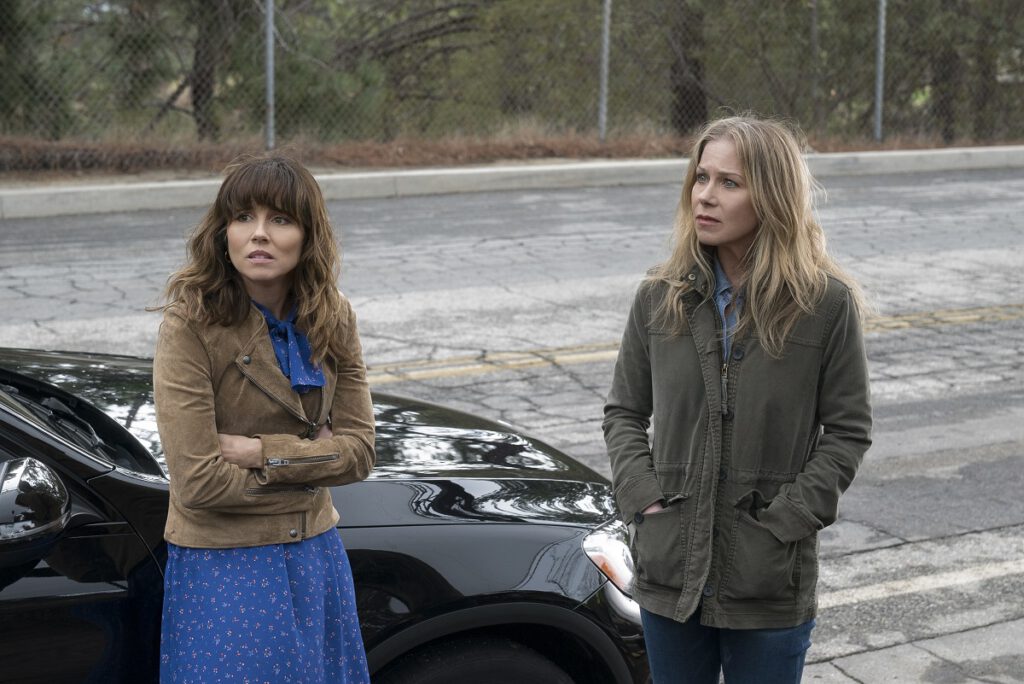There’s a lot this review won’t tell you about “Dead To Me,” Netflix’s new series premiering today with ten episodes. That’s not totally unusual—reviews, after all, are as much intended for the person who hasn’t seen something as the person who has, and that’s doubly true of shows like this one, which has cliffhangers and twists embedded deep within its foundation. This is a series, however—like Amazon’s “Forever,” and a few others—where even the real premise is off-limits. It’s frustrating from a writing perspective, but a necessary evil, because in this case being held at arm’s length from the truth is a feature, not a bug. What, you think you don’t know much about “Dead To Me”? Try being one of its characters.

Created by Liz Feldman (“2 Broke Girls”), “Dead To Me” is a dark, dark comedy about Jen (Christina Applegate in career-best performance), a woman processing her loss one extremely grim punchline at a time. Her rapidly evaporating well of patience and mercurial temper don’t help her much in her job as a real estate agent, and they certainly don’t make her a perfect fit for “Friends of Heaven,” the support group she joins months after her husband was struck and killed in a hit and run. Yet somehow, in that group, she finds a kindred spirit, who finds a way past Jen’s spike-filled trenches with a few well-timed jokes of her own.
<span class="s1" That person is Judy (Linda Cardellini, every bit as good as Applegate here), an open-hearted woman processing a number of big losses of her own. It’s not just the jokes that endear her to Jen, despite the latter’s best efforts to resist. It’s also the story she tells the support group: a handsome fiancé, a life dreamed of, a sudden heart attack, indescribable loss. We see some of that loss as the series cuts to a bereft Judy in a hospital, held tightly by a compassionate nurse. These brief flashbacks occur from time to time throughout the show, either verifying or complicating the story we’ve just heard. They’re necessary, because one of the show’s common themes is that both intimacy and truth are often shaped by perspective; we believe what we’re told, but truth and lies alike can be more complicated than they might seem.
That’s a long way of saying that both Jen and Judy hold plenty back, and that this review can reveal none of it. The same is true of the majority of the cast of characters, a roster which includes Jen’s sons (Luke Roessler and Sam McCarthy), her nuclear-grade passive-aggressive mother-in-law (Valerie Mahaffey), her partner (Max Jenkins) and one of her wealthy clients (James Marsden), as well as an elderly friend of Judy’s (Ed Asner) and the good-looking stranger (Brandon Scott) she meets at a grief retreat. Many other stories would ensure these characters to repress their trauma and lie to themselves ineffectively, and it must be said that Judy isn’t always great at keeping her own burdens hidden from herself, good as she might be at concealing them from others. Yet for the most part, “Dead To Me” allows the people who move through its story to excel at self-deception, a choice that’s more honest, more interesting, and very convenient for a series so devoted to twists and cliffhangers.

Some of those twists work better than others; some of the shock-after-shock stuff wears a bit thin. In fact, the most satisfying surprises often come when the series bypasses a big soap opera moment and instead focuses on a moment that’s smaller, more humane—a simple expression of grief, a surprising moment of self-awareness or compassion from an unexpected source, a loss more ordinary, an act of violence more common, a lie far more hurtful than the already hurtful truth. In that way, it mirrors the show’s most effective moments of comedy. Jen’s caustic, often woeful one-liners are much funnier than, say, the surreal show choir-praise team hybrid that shows up mid-season, or the vapid-past-reason clients who pepper Jen with questions about cabinetry. Her stone-faced reactions to her mother-in-law’s histrionics are much funnier than the keening and gnashing of teeth, though Mahaffey is, in her few appearances, a definite standout.
In short, “Dead To Me” is at its best when the smartest, saddest, and funniest people in the room are the characters, not the writers who create the world in which they live. (It’s great writing in general, just much stronger when character-focused.) It’s best when the camera mimics Jen’s blank stare (and Applegate’s world-class deadpan), flatly capturing the absurdities of a world she’s forced to navigate despite the fact that her own has, in a way, ended. It’s unblinking and unsparing, taking in all the ugliness of grief and the blessed relief of an honest friendship with equal frankness. That frankness is “Dead To Me”‘s second most valuable asset; the first, of course, is the pair of performances on which it most frequently centers.
Applegate and Cardellini are never really bad in anything, and they’re terrific here on their own. But when they’re together, when they provide the messy, funny, undeniably warm rapport that defines this unusual friendship, “Dead to Me” (please forgive the phrase) comes to life. It makes the show’s occasional missteps—a twist too many, the odd joke too knowing, and a finale that feels like it belongs to a different series, to name a few—well worth enduring. It’s kind of like life in that way, Judy might say. And Jen would scoff, roll her eyes, and pour another glass of wine. But she’d know it’s true, and Judy would know she knows, and they’d go on enduring it all together.
Complete season watched for review.












